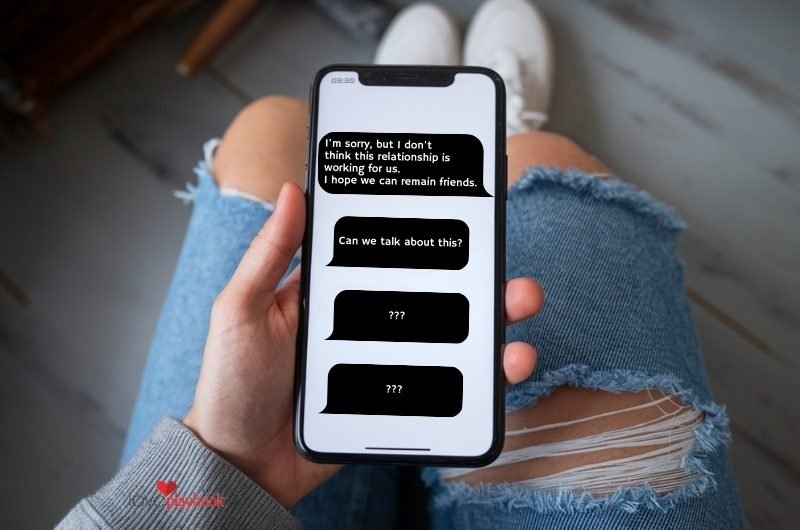Why Won’t My Ex Talk to Me? A Brutally Honest Breakdown of Post-Breakup Silence
Okay, so you’ve broken up, and now your ex won’t talk to you. Not even a peep. No replies to your texts. They’ve probably even unfollowed you on Instagram. Maybe you’re overanalyzing every little thing, asking yourself: What does this mean? or Did I screw up that badly?
Before you spiral down a rabbit hole of Why doesn’t my ex want to talk to me anymore?, let’s take a step back. I’m not going to sugarcoat it—it sucks. But there’s usually more going on than what it feels like on the surface. Let’s get into the nitty-gritty of why your ex has gone radio silent, what that means, and most importantly, what you should (or shouldn’t) do about it.
| TL;DR: Your ex isn’t talking to you because they’re overwhelmed, avoiding pressure, processing anger, or just moving on. Respect their silence, and focus on yourself. You’ve got this. |
First Things First: Why Silence Hurts So Much
Let’s call it what it is—being ignored by someone who used to care about you is brutal. Here’s why it messes with your head so much:
- Rejection feels personal: Even if it’s not, silence feels like they’re saying, You don’t matter anymore.
- Your brain craves closure: Without communication, your mind fills in the gaps, usually with worst-case scenarios.
- Anxiety goes through the roof: Every unread text and unanswered call triggers that little voice in your head whispering, What if this is my fault?
But here’s the thing: their silence? It’s not always about you. A lot of times, it’s about what they’re dealing with internally.
Yeah, it sucks to hear, but understanding why they’ve gone quiet can help you stop overanalyzing and start focusing on yourself. Let’s break it down.
11 Reasons Your Ex Won’t Talk to You

1. They’re Completely Overwhelmed
Let’s be real—breakups are exhausting. You’ve got emotions flying everywhere: guilt, anger, sadness, relief, and confusion. Your ex might be feeling all of this and trying to deal with the rest of their life. Work, family, their cat puking on the rug—it’s a lot.
Why They Might Be Overwhelmed:
- The breakup drained them: Even if they initiated it, breakups are an emotional marathon.
- They’re juggling too much: Work deadlines, family drama, or just trying to keep their sanity.
- They’re not ready to face you: Talking to you means dealing with messy feelings, and they might not be up for that yet.
What You Should Do:
- Leave them alone for a bit. Seriously, back off. Let them process everything.
- Use this time to process your own emotions instead of obsessing over theirs.
2. They’re Avoiding the “Let’s Get Back Together” Talk
This one’s a biggie. If they think talking to you will lead to you begging them to reconsider or convincing them they made a mistake, they’ll avoid you like the plague. Even if you’re not planning to, they might assume that’s where the conversation will go.
How to Tell This Might Be the Reason:
- They told you during the breakup, I need space.
- They’ve said things like, I don’t want to keep having the same conversation.
- You’ve reached out multiple times, and it’s clear they’re not interested in rehashing things.
What You Should Do:
- Respect their boundaries. Don’t be that person who sends 15 “can we talk?” texts in a row.
- Show them (through your actions, not words) that you’re giving them the space they asked for.
3. They Think Everything’s Already Been Said
Sometimes, your ex might feel like they’ve explained themselves during the breakup and there’s no point in talking more. For you, it might feel like there are a million things left unsaid. But from their perspective? The chapter’s closed.
Why This Happens:
- They’ve already mentally checked out of the relationship.
- They think more talking will just bring up the same arguments again.
- They’re prioritizing moving on over clearing up every little detail.
What You Should Do:
- Write out your thoughts in a journal instead of sending them another text. It’s a good way to process your feelings without expecting something from them.
- Focus on finding closure for yourself. They don’t owe you closure, no matter how much it feels like they do.
4. They Don’t Want to Give You False Hope
Let’s say your ex does care about you (on some level), but they know deep down they don’t want to get back together. If they keep talking to you, it could send mixed signals. They might think silence is the kinder option, even though it doesn’t feel that way to you.
Why This Feels Cruel:
- It’s confusing. You’re left wondering, Do they care? Do they hate me?
- You’d rather hear a firm “no” than deal with silence.
What You Should Do:
- Accept their silence as a boundary, not a personal attack.
- Stop looking for “hidden meanings” in small interactions, like them liking your old Instagram photo.
5. They’re Angry or Hurt

Let’s be real—breakups don’t usually happen without some drama. Maybe there was an argument or something unresolved, and now they’re stewing in their feelings. Anger and hurt are tricky emotions, and silence might be their way of coping.
How to Tell They’re Angry:
- You fought right before the silence started.
- They’ve blocked you on social media or avoided mutual friends.
- You’ve heard from others that they’re upset with you.
What You Should Do:
- Reflect on your part in the breakup. Did you say or do something that crossed the line? If so, own up to it (but only when they’re ready to talk).
- Give them time. Anger doesn’t last forever, but pushing them now might make it worse.
6. They Feel Unsafe
This one’s hard to admit, but it’s important. If things got intense during or after the breakup—constant messages, showing up uninvited, or arguments that got out of hand—your ex might feel like cutting contact is the only way to protect themselves.
Signs You Might’ve Crossed a Line:
- They explicitly told you they feel uncomfortable or unsafe.
- You’ve been reaching out obsessively or showing up unannounced.
- They’ve blocked you on multiple platforms.
What You Should Do:
- Stop contacting them immediately. Seriously, don’t justify or explain—just stop.
- Take time to reflect on your behavior and, if needed, seek help (like therapy) to understand and change it.
7. They’re Moving On with Their Life
Here’s a hard truth: sometimes, your ex isn’t talking to you because they’re busy moving forward. Breakups are a chance to rebuild your life, and they might be focusing on work, hobbies, or even new relationships.
Why It Feels Like a Gut Punch:
- You’re still in the grieving stage while they seem to have it all figured out.
- Their silence feels like they’re erasing you from their life.
What You Should Do:
- Stop comparing your healing journey to theirs. Everyone moves on at their own pace.
- Focus on yourself—your goals, hobbies, and what makes you happy.
8. They’re Protecting a New Relationship

This one might sting, but it’s a reality you have to consider. Your ex might be seeing someone new and feels that staying in contact with you would jeopardize their fresh start. Even if they aren’t officially in a new relationship, they might be talking to someone and want to avoid drama or complications.
Why They Go Silent in This Situation:
- They don’t want to give the new person a reason to feel insecure.
- They want to create emotional distance to move on fully.
- They feel guilty about the idea of “rubbing it in” if they’ve moved on quickly.
What You Can Do:
- Avoid stalking their social media for clues (it’ll only make you feel worse).
- Accept that their focus is elsewhere and remind yourself that their choices don’t define your worth.
9. They’re Struggling with Their Own Mental Health
Breakups can trigger all kinds of emotional challenges. If your ex is dealing with anxiety, depression, or other mental health struggles, they might be pulling away from everyone, not just you. Sometimes, they might not have the capacity to handle their own emotions, let alone yours.
Signs Mental Health Could Be a Factor:
- They’ve withdrawn from mutual friends, not just you.
- They seemed emotionally overwhelmed before or during the breakup.
- You’ve noticed them disengaging from activities or responsibilities.
What You Can Do:
- Give them space to focus on themselves.
- Avoid taking their silence personally—it might be about their struggles, not your relationship.
10. They Want to Reinforce the Breakup
If your ex wants to make the breakup “stick,” they might see silence as the best way to establish a clean break. Talking to you, even casually, could blur the boundaries and make it harder for both of you to move on.
Why They Think Silence Works:
- It prevents miscommunication or mixed signals.
- It avoids reliving the emotional pain of the breakup.
- It gives them the mental space to rebuild their life.
What You Can Do:
- Recognize that silence might be their way of setting boundaries, not punishing you.
- Respect their need for a clean break, even if it’s painful for you.
11. They Don’t Know What to Say
Let’s be honest—breakups are awkward. Your ex might genuinely have no idea what to say to you. They could be afraid of saying the wrong thing, reopening old wounds, or getting caught in a long, emotional conversation they’re not ready for.
Why Silence Feels Safer to Them:
- They don’t want to risk hurting you (or themselves) further.
- They’re not ready to process the breakup through a conversation.
- They’re avoiding the possibility of conflict or emotional vulnerability.
What You Can Do:
- Recognize that their silence might not be malicious—it could just be uncertainty.
- Avoid pressuring them to talk if they’re not ready.
How to Cope with the Silence
Alright, so now that you (hopefully) understand some of the reasons behind your ex’s silence, what can you actually do about it? Spoiler alert: not much, except take care of yourself.
DO:
- Give them space.
- Use this time to reflect and heal.
- Lean on friends, family, or even a therapist for support.
DON’T:
- Keep texting or calling them.
- Stalk their social media or overanalyze every post.
- Use mutual friends to get “updates” on them.
The Bigger Picture
At the end of the day, silence is tough, but it’s not the end of the world. Your ex might not be talking to you because they need time, space, or closure for themselves—and that’s okay. It’s not always about you or something you did wrong.
Focus on what you can control: your own healing, growth, and happiness. It’s not easy, but trust me, it gets better.


